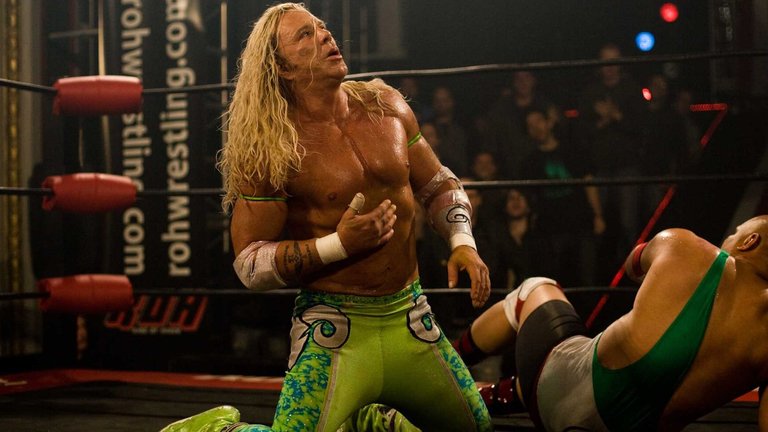Film Review: The Wrestler (2008)

Mickey Rourke's journey through Hollywood is a compelling story of talent, turmoil, and eventual redemption. In the 1980s, he was heralded as one of the hottest stars, with a promising trajectory that seemed destined for greatness. However, a series of personal problems and questionable career choices led to his decline, transforming him into the quintessential "Has Been." It was only well past his prime that Rourke delivered what many consider his finest performance in The Wrestler (2008), a film that, paradoxically, may not be particularly loved by his long-time fans. Directed by Darren Aronofsky, this sports drama encapsulates the essence of Rourke's own tumultuous life and career.
Rourke portrays Robin Ramzinski, better known as Randy "the Ram" Robinson, a professional wrestler who once basked in the limelight of the 1980s but now finds himself wrestling sporadically in the semi-professional circuit of Northern New Jersey. Living in a trailer and struggling to pay rent, Ram's life is a stark contrast to his former glory. He attempts to make ends meet through various low-paying jobs while finding solace in visits to a local strip club. Here, he forms a connection with Cassidy (played by Marisa Tomei), an ageing stripper who mirrors his own decline. Cassidy encourages Ram to reconnect with his estranged teenage daughter Stephanie (played by Evan Rachel Wood), who harbours resentment towards him for abandoning their family. The plot thickens as Ram is invited to celebrate the 20th anniversary of a match against his legendary rival Bob "the Ayatollah" (played by Ernest Miller). However, just before this pivotal rematch, Ram suffers a heart attack and is advised by doctors to cease wrestling if he wishes to live.
Rourke's embodiment of Randy "the Ram" is particularly poignant given the parallels between the actor's life and that of his character. Both experienced their peaks in the 1980s, both were athletes and faced significant declines thereafter. Rourke's commitment to the role was evident; he undertook rigorous physical preparation at 55 years of age while embracing an unflattering appearance that included fake blonde hair and an exaggerated physique influenced by steroids. This transformation not only highlighted his dedication but also served to underscore the character’s tragic arc.
In many respects, Rourke’s portrayal can be seen as an anti-Rocky; rather than a triumphant comeback story, it depicts a man whose life is marked by failure both professionally and personally. While Rourke elicits sympathy for Ram, he also conveys an inevitable sense of doom regarding Ram’s attempts at redemption—whether through fatherhood or romantic involvement with Cassidy. The film suggests that despite his efforts, Ram's life is irreparably marred by past mistakes and physical tolls from years in the ring. Ultimately, he returns to wrestling, fully aware that this choice may cost him his life.
The film's dark tone aligns with Aronofsky’s thematic preoccupations seen in works like Requiem for a Dream. The bleak resolution of subplot involving Stephanie adds layers of melodrama that some may find excessive. Aronofsky’s stylistic approach here veers towards cinema verité rather than the more poetic aesthetics of his earlier films.
Moreover, the quasi-documentary style enhances audience immersion into the world of professional wrestling—a realm often dismissed as mere spectacle outside the United States. By featuring real-life wrestlers playing fictionalised versions of themselves, the film reveals a complex subculture where public rivalries mask genuine friendships. While wrestling matches are choreographed performances, they demand extensive physical preparation and carry substantial risks—elements that The Wrestler captures with authenticity.
Despite its merits, The Wrestler also bears the hallmarks of an Oscar-bait film, crafted around Rourke’s powerful performance which garnered widespread acclaim and numerous nominations. However, it is essential to acknowledge that other performances within the film also contribute significantly to its impact.
Marisa Tomei shines as Cassidy, delivering a nuanced portrayal of an ageing stripper who, unlike Ram, has learned harsh lessons from her own experiences. Tomei in many ways delivers performance more impressive and memorable than her comical Oscar-winning role in My Cousin Vinny. Her willingness to strip on screen, something quite rare for Hollywood actresses of her age and stature, is another commendable aspect of her role.
Ultimately, The Wrestler stands as a significant cinematic achievement that briefly revitalised Rourke’s career—a bittersweet reminder of what could have been had circumstances been different. Although it brought Rourke a lot of well-deserved critics praise and Oscar nomination, many fans may would likely prefer to see him in more uplifting roles reminiscent of his earlier successes in the 1980s.
RATING: 7/10 (+++)
Blog in Croatian https://draxblog.com
Blog in English https://draxreview.wordpress.com/
InLeo blog https://inleo.io/@drax.leo
Hiveonboard: https://hiveonboard.com?ref=drax
Rising Star game: https://www.risingstargame.com?referrer=drax
1Inch: https://1inch.exchange/#/r/0x83823d8CCB74F828148258BB4457642124b1328e
BTC donations: 1EWxiMiP6iiG9rger3NuUSd6HByaxQWafG
ETH donations: 0xB305F144323b99e6f8b1d66f5D7DE78B498C32A7
BCH donations: qpvxw0jax79lhmvlgcldkzpqanf03r9cjv8y6gtmk9